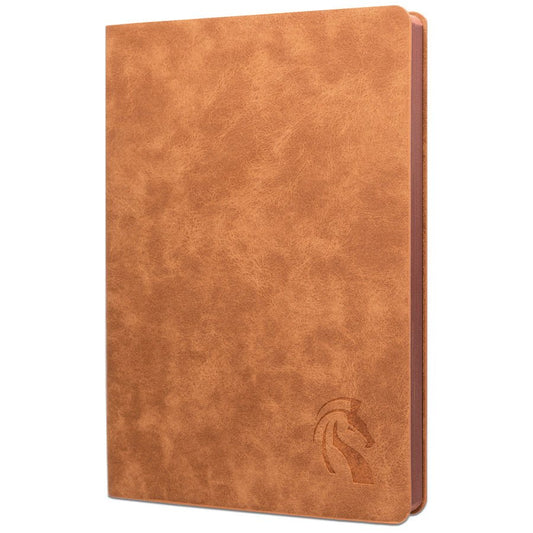
If you often find yourself feeling anxious, you’re not alone. Anxiety is something many of us experience, but it can be managed with the right tools and mindset.
These 50 journal prompts are designed to help you understand your feelings, discover what triggers your anxiety, and find ways to cope. By reflecting on these questions, you can begin to take control and make your days brighter and less stressful.
Let’s start this journey to a calmer mind together!
Understanding Your Anxiety
- What triggers your anxiety the most?
- How does anxiety feel in your body?
- What time of day is your anxiety the worst?
- What were you doing last time you felt anxious?
- Write about what anxiety stops you from doing.
- How does your anxiety affect your daily routines?
- What are three things that worsen your anxiety?
- What’s something you wish others knew about your anxiety?
- How has your understanding of your anxiety changed over time?
- What’s the hardest part about explaining your anxiety to friends?

"Anxiety does not define you; it's just one part of your journey."
Your Anxiety Management Tools
- What relaxation techniques work best for you?
- Write about a time a breathing exercise helped you.
- What are some comforting words you can tell yourself when you feel anxious?
- Which activities distract you from your anxiety?
- Who do you talk to when you feel anxious?
- What music calms you down?
- Describe your safe space. What makes it comforting?
- How do you prepare for a stressful event?
- What’s a small victory you’ve had over your anxiety recently?
- How do you celebrate moments when you manage your anxiety well?

"Take one day at a time; each step is progress."
Anxiety in Relationships
- How does anxiety affect your relationships?
- Write about a time someone helped you through an anxiety attack.
- What do you need from others when you’re anxious?
- How do you communicate your anxiety needs to others?
- What misunderstandings have happened because of your anxiety?
- How do you maintain friendships despite your anxiety?
- How does social media impact your anxiety?
- What’s something supportive you wish people would say when you’re anxious?
- How can you set boundaries to protect your mental health?
- What are the signs that you need to take a break from social interactions?

"Peace comes from within. Do not seek it without."
Reflecting on Causes and Effects
- What are the root causes of your anxiety, if known?
- How does sleep—or lack thereof—affect your anxiety?
- Does your diet influence your anxiety levels?
- Write about how exercise impacts your anxiety.
- What long-term effects has anxiety had on your life?
- How do you deal with anxiety in public places?
- What changes have you noticed in your anxiety over the last year?
- How does weather or seasons affect your anxiety?
- Describe a day when you managed your anxiety from morning till night.
- What role does clutter or your environment play in your anxiety?

"Embrace your struggles; they shape your resilience."
Looking Forward
- What are your goals for managing anxiety?
- How do you envision your life without anxiety?
- What are some daily practices you want to adopt to reduce anxiety?
- What’s one thing you can do tomorrow to lessen your anxiety?
- How do you see your progress in one year from now?
- What are you hopeful about in your journey with anxiety?
- What new method or therapy are you willing to try?
- Write about someone who inspires you in how they manage their anxiety.
- What do you hope to learn about anxiety that could help you?
- How can you help others who struggle with anxiety?

Congratulations on taking the time to reflect on your anxiety through these journal prompts. Every question you’ve answered has helped you gain insight into your anxiety and how it affects your life.
Remember, managing anxiety is a journey, not a sprint. Keep using these prompts as often as needed to help guide your thoughts and actions towards a more peaceful life. You are capable of overcoming your challenges, and every step forward is a step towards tranquility.
Anxiety is a common mental health challenge that affects millions of individuals worldwide. It can manifest in various forms, including stress, overwhelming thoughts, and anxious feelings that interfere with daily life. Fortunately, there are many effective strategies and tools available to help manage anxiety, and journaling is one of the most powerful ways to cope with and understand your emotions. This blog will explore how journaling, along with other techniques, can support your mental health journey.
What Is Anxiety?
Anxiety is more than just feeling nervous; it is a persistent sense of worry, stress, or fear that can lead to physical symptoms like a rapid heartbeat, sweating, or difficulty breathing. It affects your mind, emotions, and body, and without proper care, it can become overwhelming. Anxiety levels can fluctuate, sometimes leading to intense anxious thoughts and other times becoming manageable with effective tools and strategies.
The Benefits of Journaling for Anxiety
Journaling is a great way to navigate your emotions, track your thoughts, and find a safe space to express yourself. Journaling for anxiety has numerous benefits, including reducing stress, improving mental well-being, and helping individuals gain insight into their triggers. Here are some key benefits of using a journal for anxiety:
- Provides a Private Space: Journaling creates a private space to express your thoughts without judgment. It’s a way to write freely, allowing emotions to flow onto paper.
- Promotes Self-Awareness: Writing down your thoughts helps in understanding patterns, triggers, and anxiety symptoms. It’s a great way to practice self-awareness.
- Encourages Positive Thinking: Positive affirmations and gratitude journals can shift your mindset, reducing negative thoughts and promoting a sense of calm.
- Supports Emotional Health: Journaling can help you process your emotions, leading to better emotional health and resilience.
- Acts as a Safe Space: Your journal is a safe space where you can be completely honest about your feelings and thoughts.
Anxiety Journal Prompts to Get You Started
If you’re unsure where to start, anxiety journal prompts can be a powerful tool. Prompts can guide your thoughts, encourage introspection, and provide structure to your journaling practice. Here are some examples of anxiety journal prompts:
- What are three things that triggered your anxiety today, and how did you respond?
- Write a list of things that bring you joy and help calm your mind.
- Describe a time when you overcame an anxious moment. What strategies did you use?
- What are five positive things about yourself that you can focus on next time you feel anxious?
- How does your body feel when you are experiencing anxiety?
How Journaling Helps Manage Anxious Thoughts
Expressive writing is an effective way to manage overwhelming thoughts. By putting your emotions on paper, you can gain insight into what triggers your anxiety and how to better cope with it. This practice helps you understand patterns in your behavior and emotions, leading to more effective strategies for stress management.
Printable Anxiety Trackers
Another helpful tool is a printable anxiety tracker. These can be used to monitor anxiety levels, track symptoms, and identify patterns over time. This can be particularly useful for individuals looking to work with a therapist, as it provides clear data to discuss during therapy sessions.
Other Coping Strategies for Anxiety
While journaling is a fantastic way to manage anxiety, it’s important to explore other coping strategies that can complement your journaling practice. Here are some effective methods:
Mindfulness and Relaxation Techniques
Mindfulness and relaxation techniques, such as meditation and breathing exercises, help bring your focus back to the present moment. Mindfulness encourages self-compassion, allowing you to approach your anxious thoughts with a calm mind. Calm.com offers resources for guided meditations, which are great for beginners.
Cognitive Behavioral Therapy (CBT)
CBT is a type of therapy that focuses on changing negative thought patterns. By recognizing these patterns, you can develop healthier ways of thinking and reacting to anxiety triggers. CBT is often used in combination with journaling prompts to reinforce positive changes.
Practicing Gratitude and Positive Affirmations
Gratitude journals encourage you to focus on positive things in your life. By regularly practicing gratitude, you can shift your focus away from worry and stress, leading to a more positive mood. Positive affirmations can also combat negative self-talk, replacing it with empowering statements.
Seeking Professional Help
For those who find that anxiety is interfering significantly with their daily life, seeking professional help is essential. A therapist can offer support, guidance, and effective treatment methods such as talk therapy, CBT, and even support with managing symptoms related to childhood trauma or traumatic events.
Developing a Daily Journaling Practice
Creating a daily journaling practice can be a healthy way to manage anxiety. Set aside a few minutes each day to write in your journal, whether it’s in the morning to start your day with positive affirmations or at night to reflect on the events of the day. Here are some tips for maintaining a consistent journaling routine:
- Find the Right Time: Choose a time of day that works best for you, whether it’s morning, afternoon, or night.
- Create a Comfortable Space: Your journaling environment should feel comfortable and safe. This can be your bed, a desk, or any spot where you feel at ease.
- Use a Journal That You Love: Having a notebook that feels special can make your journaling practice more enjoyable.
- Be Consistent: Try to write at the same time each day, even if it’s only for a few minutes. Consistency is key.
Anxiety Journal Prompts for Emotional Growth
Journaling can also be a tool for personal growth. Here are some emotional journal prompts to encourage self-discovery and resilience:
- What are three things you are grateful for today?
- Write about a recent challenge and what you learned from it.
- Describe a time when you felt proud of yourself. How can you recreate that sense of accomplishment?
- What are some coping strategies that have worked for you in the past?
The Importance of Addressing Anxiety Triggers
Understanding what triggers your anxiety is the first step to managing it. By identifying triggers, you can develop coping strategies to handle them better. Journaling allows you to record and analyze your reactions to certain situations, making it easier to address these triggers head-on.
Anxiety Triggers and How to Address Them
- Social Situations: Feeling anxious in social settings can be overwhelming. Preparing ahead of time with positive affirmations can reduce stress.
- Work or School Pressure: Stress related to performance can lead to anxiety. Practice mindfulness and journaling to manage these feelings.
- Past Traumatic Events: Therapy, especially CBT, can help address anxiety stemming from past trauma. Journaling about these experiences in a safe space can also aid in the healing process.
Expressive Writing: A Great Way to Cope
Expressive writing, where you freely express your emotions on paper, can be a healthy way to manage overwhelming thoughts. Unlike structured journaling, expressive writing does not require prompts, making it an excellent choice for those who prefer a more freeform approach.
Journaling Practice to Promote Positive Thinking
Developing a journaling practice that encourages positive thinking can enhance your mental well-being. Writing down things you are thankful for, reflecting on positive experiences, and setting small, achievable goals can all lead to a healthier outlook on life.
Anxiety Journals and Where to Find Them
Many different types of journals are available, from gratitude journals to anxiety-specific notebooks. These journals often include guided prompts and space for reflection, making it easier to start your journaling journey. Some journals even include sections for gratitude, positive affirmations, and lists that can be beneficial for self-awareness.
Printable Anxiety Trackers and Other Resources
Printable anxiety trackers can be found online at no extra cost, and many are designed to be easy to use. These tools allow you to monitor your anxiety levels, track progress, and even identify patterns. Using a tracker alongside a journaling practice can provide a comprehensive view of your mental health.
The Power of Therapy in Managing Anxiety
Therapy, whether it’s talk therapy, cognitive behavioral therapy, or other forms, can be an essential tool in managing anxiety. Working with a therapist allows you to explore your emotions, develop coping strategies, and gain insight into how your thoughts affect your daily life. Therapy can also help individuals dealing with symptoms of depression, trauma, or burnout, which often coexist with anxiety.
Conclusion: The First Step Towards Healing
The journey to managing anxiety begins with the first step. Whether that step is picking up a pen and starting to journal, seeking professional help, or using positive affirmations to shift your mindset, every effort counts. Anxiety can be challenging, but with the right tools and support, it is possible to navigate it and build a healthier, happier life.
Small Commission and Purchase Products
When looking for anxiety journals or printable trackers, some may come with a small commission for purchases made. Make sure to explore the options and find what suits your needs best. Investing in the right tools can make a significant difference in your mental well-being.
Final Thoughts on Anxiety Journaling
Journaling is more than just writing; it’s a therapeutic process that promotes self-awareness, emotional growth, and resilience. By creating a private space where you can express your thoughts freely, you take control of your mental health journey. Next time you feel overwhelmed, take a moment to write — it might just be the key to calming your mind and finding peace.
Journal Prompts To Help With Anxiety
“Writing daily withjournal prompts to help with anxietycan change lives.”
let prompt = 'help with anxiety';
More about prompts to help with anxiety
Helpful content inside- Prompt
- To help with anxiety
Read Other Related Journal Prompts
50 Journal Prompts For Bedtime Reflection50 Journal Prompts For Those Enjoying Music
50 Journal Prompts For Those Who Love To Travel
50 Journal Prompts For Those Reflecting on June














1 comment
I really liked the text, these prompts can aid in mental clarity and emotional release, fostering a sense of calm and control.